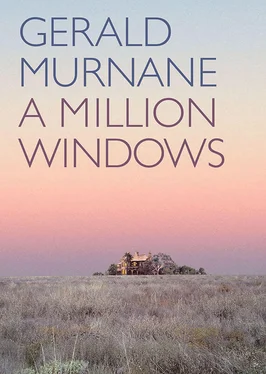If my mood were wilful, I might reply that my way of writing is intended to prevent even an undiscerning reader from trying to apprehend my subject-matter in the way that a viewer, or so I suppose, apprehends the subject-matter of a film. A more respectful reply might include the information that these paragraphs are examples of what I call considered narration and the claim that the reader of such paragraphs is entitled to suppose hardly more than that the narrator of the paragraphs was alive at the time when they were written and felt urged to report certain matters.
The reader’s entitlements are limited indeed, but of course he or she, while reading a considered narrative, postulates or supposes with little regard for any such limits. Many a reader, for example, might seem while reading to hear what might be called the voice behind the narrative or even to see what might be called the personage behind it. The narrator, of course, knows nothing of such matters but I, the narrator of this work of fiction, am hopeful that many a discerning reader has understood by now why a piece of considered narration ought to include verbs in both the present and the past tense; has understood that a considered narrative reports both that certain events may have taken place, or may have seemed to take place, and also what it is to have knowledge of these matters.
The previous sentence seemed, while I was composing it, a most apt ending for this, the sixth section of this work of fiction. However, I found just now, among the scribbled pages meant to prompt me while I composed the section, certain notes that I could not bring myself to leave unused. One note was intended to remind me of something that I heard from a university lecturer in Islamic philosophy nearly fifty years ago, when I was a mature-age student in a faculty of arts. What may have been the lecturer’s purpose in telling his class what he told them I long ago forgot, if ever I understood it, although it was surely to do with the phenomenon that we call time . He asked us to call to mind a motor-car travelling on a road across a mostly level landscape. A person standing close beside the road and looking directly ahead would be aware for some time that the car has not yet reached him or her, then, for a brief time, that the car is present to his or her sight and then, for some time afterwards, that the car is no longer present, even if still audible. The lecturer then asked us to call to mind a person looking towards the road from an upper window of a building at some distance away. This person is aware of the car as being present to his or her sight during the whole time while it seems to be approaching, present to the sight of, and then travelling away from the person beside the road.
While I was writing the previous paragraph, it occurred to me that the lecturer mentioned might have been trying to explain the notion of eternity and that the observer in the upper room, for whom the present is prolonged, as it were, is meant to call to mind none other than God, who from a vantage-point beyond the last of the stars sees all human history as eternally present. Commentators on works of fiction sometimes have used terms such as god-like to describe the extensive knowledge that certain narrators lay claim to: knowledge of the thoughts and feelings of more than one character in the one fictional work and also a view, so to call it, ranging over many fictional settings and over the fictional present and past. I myself have never laid claim to any such knowledge, but sometimes while writing this and the previous paragraph I felt as though mine might not be the only view of my subject-matter. I felt as an observer might feel when he or she strains to look across some or another mostly level landscape while behind him or her some or another personage sees from an upper window all that the observer strains to see and more.
It would be absurd to suppose that the experience of some or another personage looking out from an upper window of a building of two or, perhaps, three storeys must be different in quality from that of some or another personage strolling in the grounds below. Nor do I intend to make the familiar claim that the personages reported as living fictional lives in this or any other work of fiction are somehow outside or beyond what we know as time; that such personages exist in some sort of timeless realm often assumed to be superior to our own. (Surely a person is able to sample the experience of eternity without having to read fiction? I found just now a passage that I copied more than thirty years ago from the translated writings of Alfred Jarry: ‘It is fine to live two different moments of time as one: that alone allows one authentically to live a single moment of eternity, indeed all eternity since it has no moments.’) What I was hoping to do when I began this paragraph was to explain, for myself as much as for the reader, why I cannot call to mind any detail of a certain house of two or, perhaps, three storeys (the silent corridors in the far-reaching wings, for example, or the grounds where strollers readily lose their way among hedges or thickets or ferneries, or the immense and mostly level distances to be seen from upper windows) without the conviction that the personages frequenting the place exist not in any sort of temporal progression but in what might be called the narrative dimension , which not only extends infinitely backwards and forwards, as we might say of our own time , as we call it, but has what I perceive to be a breadth or depth, likewise immeasurable.
How should I begin this paragraph? A certain male personage often recalls that he spent much time as a child looking at reproductions of famous paintings and wondering about a matter that he supposed would be for ever beyond his power to resolve. I was wrong to use the word wondering in the previous sentence. Surely no one, in fact, wonders. Surely we postulate, speculate, or supply possible answers rather than remain agape and vacant-minded. What I ought to have written was that the personage spent much time as a child seeing in mind whatever was out of his sight in the backgrounds of famous paintings, or to either side of the places depicted there, or in the sight of those painted personages who looked not towards their painter or their viewer but at persons, places, or things forever invisible to both. Given that the personage mentioned saw as a child no other reproductions of paintings apart from the twelve on the upper halves of the pages of a certain calendar sent each year as a Christmas gift to his parents by a certain devout sister of his father, most of the depicted personages that he saw were divinities or angels or saints or Biblical characters, and most of the narratives that they were caught up in were already known to him. He was therefore obliged at an early age to discover some more promising task than the envisaging of sights intended merely to inspire devotion or to promote piety in the viewer. Instead of following the gaze of kneeling worshippers upwards and past the seated Madonna and Infant or the all-seeing, all-comprehending stare of the God-man into heaven itself, he learned soon enough to see or, rather, to envisage for himself. He would send into the hilly and forested or the level and grassy backgrounds of certain paintings a version of himself hopeful of finding, beyond the last blurs and tints, a folk who were moved more by the vague or the imprecise or the random than by the certainties of religion; a folk for whom a complicated game of chance or a half-heard melody or an inexplicable dream commanded more attention than a prayer or a holy text. Or he might remain deliberately alone in the hope of meeting up with another of his own rare kind: someone, preferably female, who had found her way past the last hint of a horizon on a coloured page that he had never seen nor would ever see.
Читать дальше









